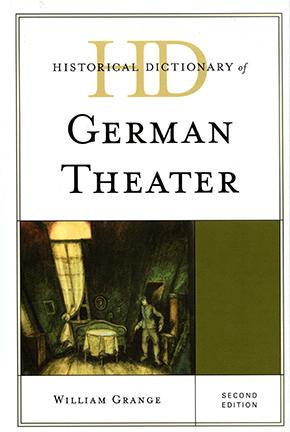Grange releases 11th book: 'Historical Dictionary of German Theater'
calendar icon14 Aug 2015

Lincoln, Neb.—William Grange, professor of theatre in the University of Nebraska–Lincoln’s Johnny Carson School of Theatre and Film, has published his 11th book, “Historical Dictionary of German Theater,” Second Edition, through Rowman & Littlefield Publishers.
The German-language theater is one of the most vibrant and generously endowed of any in the world. It boasts long and honored traditions that include world-renowned plays, playwrights, actors, directors and designers, and several German theater artists have had an enormous impact on theater practice around the globe. Students continue to study German plays in dozens of languages, and every year scores of German plays are produced in a wide variety of non-German venues.
This second edition of Historical Dictionary of German Theater covers its history through a chronology, an introductory essay, appendixes and an extensive bibliography. The dictionary section has more than 400 cross-referenced entries on directors, designers, producers and movements such as Regietheater, “post-dramatic” approaches to theater production, the role of increasingly massive government subsidies and cities whose reputations as centers of innovation and excellence that have made the German-language theater one of the most vibrant anywhere on earth.
“German theatre is largely unknown territory for American readers, largely because the United States has so little knowledge about German-speaking Europe, in general,” Grange said. “Nearly half of the American population is of German extraction, but almost no American speaks or reads German, and certainly very few indeed know anything about German theater or culture. So I wrote this book as a kind of corrective. And this is the second edition, which means there is a demand for books like this and perhaps my intentions are having some effect.”
In addition to his book, Grange has authored several scholarly essays, book chapters, journal articles, reviews and encyclopedia entries. In 2010 he was named a fellow of the German Academic Exchange Service as Guest Professor at the University of Heidelberg's Center for American Studies. He had previously held the Fulbright Distinguished Chair in Humanities and Cultural Studies at the University of Vienna, where he taught in German, concentrating on American actors, actresses, and acting.
He has also taught in German at the University of Cologne, under the auspices of the German Fulbright Commission and the University of Cologne Senate. Grange has also received awards for his research from the German Academic Exchange Service; the Harry Ransom Humanities Research Center at the University of Texas; the National Endowment for the Humanities in Washington, D.C.; the Dorot Foundation in Providence, Rhode Island; the Mellon Foundation in New York City; the International Institute of Education; the Hixson-Lied Endowment; the Jane Harrison Lyman Research Trust Fund; and several others.
A member of Actors' Equity Association since 1972, he has also appeared in several stage productions and films.
Grange received his Bachelor of Arts from the University of Toledo, his Master of Fine Arts degree from Columbia University and his doctorate from Indiana University.